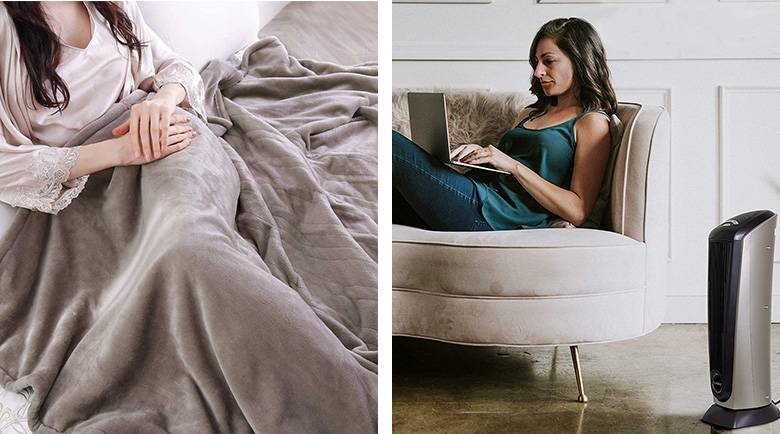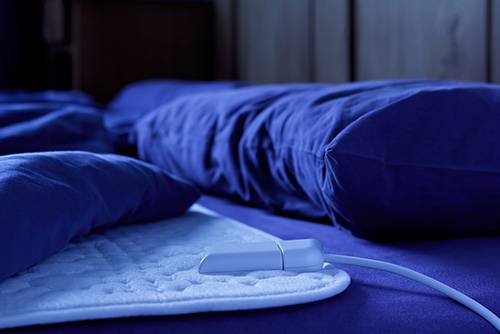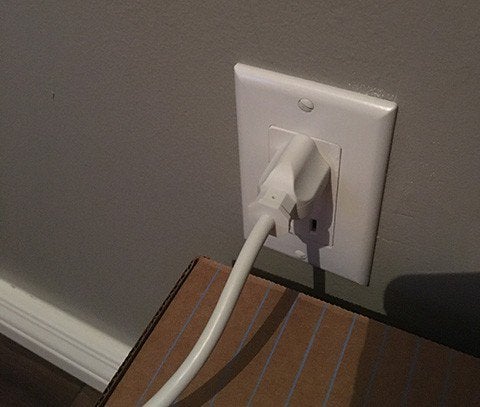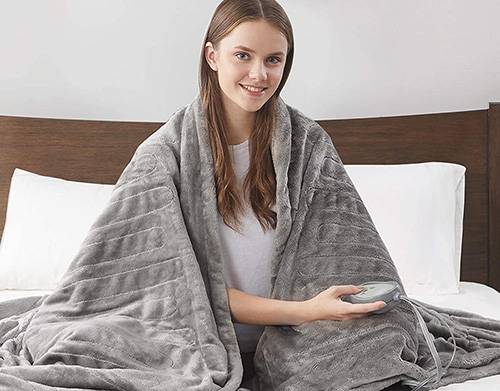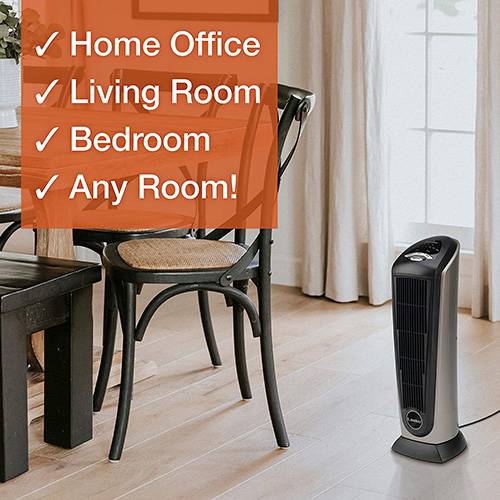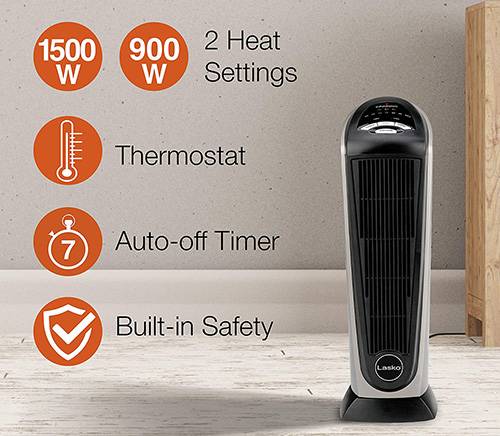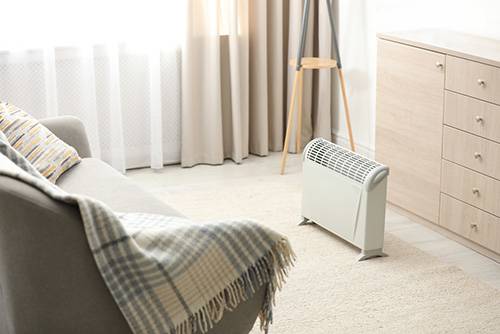If you’ve ever felt frustrated about getting home after a cold day at work only to find it nearly impossible to warm up your feet, then you’ve considered more than once that maybe it’s time to invest in an additional means of heat. Two of the most common products that come to mind in such a situation are the electrical blanket and the space heater. The choice between these two is a matter of what you’re looking to heat, how much money you’re willing to spend on electricity, and how many people would benefit from this heating solution. If you want to learn more about what sets these two products apart and determine which one is a more suitable investment in your particular situation, we’ve created a side-by-side comparison that will help you determine which option is the best.
| Electric Blankets | Space Heaters |
|
|
Electric Blankets
— How They Work
Electric blankets are basically regular blankets that have electrical wiring inside them, and they turn electricity into heat. They have cord coming out of them that require plugging them into a power outlet to function.
There are plenty of benefits to using an electrical blanket, such as the fact that it’s highly portable, inexpensive, and energy efficient. They provide even heat and you can customise the way the blanket looks since there are plenty of colors, patterns, and materials to choose from.
— Wattage
An electric blanket usually needs about 200 to 400 watts to function. In terms of consumption and how much this blanket is going to cost you, that really depends on the area where you live, but it usually means about 25 to 50 cents-worth of electricity, unless you leave it turned on for the entire night, which is not recommended because of safety reasons.
— Safety
It’s really important to talk about the safety of using an electric blanket because this is a product that could heat up to great extent and poses a danger for you once it does. Fire hazards are no joke, and you should always check for frayed or exposed wires if you want to make sure your blanket is working in good conditions.
Second, you want to make sure that your personal safety is not at risk when using an electric blanket. If you fall asleep with a heated blanket on top of you, you risk the product overheating itself up to a point where it could actually burn your skin. To avoid this from happening, you should always turn off the blanket before falling asleep or choose a blanket that either equipped with a timer so you can program it to turn itself off after a while or a blanket that is equipped with an overheating feature and that will turn the product off once a certain temperature threshold is exceeded.
— Cost
When talking about the cost of an electric blanket, think about how much is the upfront investment (a.k.a. how much you’re paying to own the product) and how much it’s going to cost you in terms of electricity consumption.
Generally speaking, an electric blanket is way less expensive to use compared to a space heater because it doesn’t consume that much electricity, and also tends to cost less. The end price of an electric blanket depends on a series of factors, such as the materials used in its construction, the size of the blanket, whether or not it has additional features, etc. An electric blanket can cost anything between $30 and $200.
— Drawbacks
Being an educated shopper means knowing about the advantages and drawbacks that each product you want to purchase comes with. Then it comes to electric blanket, you can expect the following problems to occur:
- Even with limited evidence on the topic, there is a lot of speculation on the matter of harmful effects of electromagnetic fields that would surround your body when you’re tucked underneath the electric blanket. However, we don’t necessarily consider this a drawback since the potential biological damage that these could cause has yet to be proven.
- If the blanket is not equipped with a timer/some sort of automatic overheating shutdown system and you fall asleep while it’s turned on, you could risk burning your skin.
- It is quite easy for electric blankets to suffer damage, especially if you have pets that are likely to chew on the blanket/wires.
Space Heaters
— How They Work
Space heaters are basically portable heaters that use electricity to heat up a room. They usually provide warmth in concentrated spaces, but not as concentrated as an electrical blanket. They are much more suitable for heating up larger areas and even an entire room (that depends on the size of the unit and the room itself, as a small heater will never be able to heat up a really large room in its entirety).
Space heaters also offer a range of different benefits, such as the fact that they pose a viable alternative to central heating systems (and a less expensive one) and they can heat up multiple people at once.
— Wattage
Space Heater available here.
A space heater will always require more electricity to run compared to an electric blanket, which also translates into higher costs in terms of electricity. Their wattage usually varies between 750 to 1500 watts, meaning it consumes up to four times more electricity compared to a heated blanket.
— Safety
Talking about the safety of a space heater can be complicated if you consider what the alarming statistics have to say on the topic. Home fires that result in fatalities are largely due to space heaters, but that doesn’t really mean that they are bad: it means that people aren’t using them properly in most cases.
The safety of a space heater is given by a variety of factors, such as how old or faulty the unit is or whether or not you’re sleeping with the heater turned on the entire night. Manufacturers have equipped their space heaters with a bunch of safety features that make these units safer to use, such as automatic shutdown timers or features that turn the units off if they are accidentally tipped over.
For further safety, it’s also a good idea to place the heater at least three feet away from anything that could be flammable, such as bedding or curtains.
— Cost
Space heaters are available at a bunch of different price intervals, with the least expensive models priced at a mere $20. Needless to day, there are several factors that influence the price of the product, such as its size, its heating capacity, the construction, the integrated features, how many safety measures the uni is equipped with, but also how much electricity it consumed (products that are labeled as energy efficient will generally cost more).
— Drawbacks
Some of the disadvantages of owning and using a space heater are circumcision, but we have to talk about them since they could make a difference in your shopping decision:
- Old space heaters are likely to pose a fire hazard according to certain statistics, but this could also be caused by mishandling and human error.
- Compared to electric blankets, space heaters consume more electricity and are, therefore, more expensive to run.
- If you have children or pets, it’s important to note that the surface of a heater can get very hot, and touching the surface could result in injury, so it’s best not to leave these heaters unattended if you are a parent or a pet owner.
Conclusion
If you were hoping for us to tell you which of these two options is better, the truth is that it depends on what you’re looking to obtain as you’re searching for means to stay warm. If you live alone or if you share the room with a person that isn’t very keen on high temperatures, an electric blanket is a much better choice. It will only heat the person it’s placed on, which avoids spending money on electricity unnecessarily used by a space heater.
For those of you looking to heat up an entire room, a space heater is a much more logical choice. Even if space heaters use more electricity, they are much more efficient in heating up a larger area around you. They aren’t a choice just for people who share a room, but might also be useful if you’re a single person that doesn’t want to spend the entire day walking around the room wrapped up in a blanket.
Photo credit: Agenturfotografin/Shutterstock;
New Africa/Shutterstock
